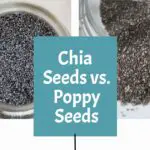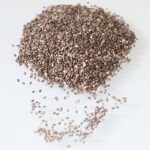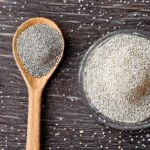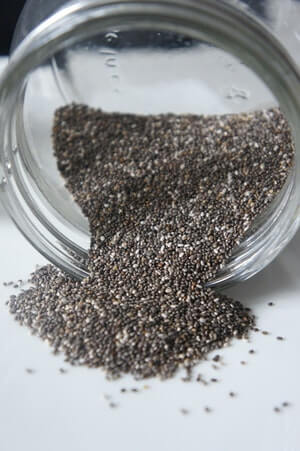Chia seeds and basil seeds are two types of seeds that are often used in cooking and for their supposed health benefits. Both seeds have unique properties and are believed to have a number of health benefits, but they come from different plants and have some differences in terms of their nutrition and uses.
In this post, we will provide an overview of chia seeds and basil seeds, compare their nutrition and potential health benefits, and discuss how they can be used in cooking and other applications.
- What are Chia Seeds?
- What are Basil Seeds?
- Chia Seeds and Basil Seeds Compared
- Common Questions
- Final Thoughts
What are Chia Seeds?
Chia seeds and basil seeds are two types of seeds that are often used in cooking and for their supposed health benefits. While both seeds have unique properties and are believed to have a number of health benefits, they come from different plants and have some differences in terms of their nutrition and uses. In this article, we will provide an in-depth look at chia seeds and basil seeds, compare their nutrition and potential health benefits, and discuss how they can be used in cooking and other applications.
Chia seeds are small, black or white seeds that come from the Salvia hispanica plant, which is native to Central and South America. They have been used as a food source for centuries by the Aztecs and other indigenous peoples of the region, and have gained popularity in recent years as a health food. Chia seeds are high in fiber and omega-3 fatty acids, and are also a good source of antioxidants, protein, and minerals such as calcium, manganese, and phosphorus. One ounce (28 grams) of chia seeds contains about 11 grams of fiber, 4 grams of protein, and 5 grams of omega-3 fatty acids.
Chia seeds can be eaten raw or ground up, and are often used in baked goods, smoothies, and as a topping for salads and other dishes. They are known for their ability to absorb liquid and form a gel-like consistency, which makes them useful as a thickening agent in recipes. When soaked in liquid, chia seeds expand and become hydrated, which can help to add moisture and texture to dishes. They can also be used as an egg replacer in vegan recipes, as they can bind ingredients together when mixed with water.
Chia seeds have a mild, nutty flavor and can be easily incorporated into a variety of dishes. They are often used as a topping for yogurt, oatmeal, and other breakfast dishes, and can also be added to smoothies, baked goods, and salads. They can also be ground up and used in place of flour in some recipes, although they do not have the same binding properties as wheat flour.
In terms of potential health benefits, chia seeds are believed to have a number of positive effects on the body. They are a good source of fiber, which can help to improve digestion and promote regular bowel movements. The high omega-3 content of chia seeds may also have anti-inflammatory effects, which may help to reduce the risk of chronic diseases such as heart disease and diabetes. Some studies have also suggested that chia seeds may help to lower blood pressure and cholesterol levels, although more research is needed to confirm these effects.
What are Basil Seeds?
Basil seeds, also known as sabja seeds, are small, black seeds that come from the Ocimum basilicum plant, which is native to tropical regions of Asia. They are often used in Indian and Middle Eastern cuisine, and are known for their ability to swell up and form a gel-like consistency when soaked in liquid. Basil seeds are sometimes used in drinks and desserts, and are believed to have a number of health benefits, including aiding digestion and helping to reduce body heat.
Basil seeds are often used in Indian drinks and desserts such as falooda and rooh afza. When soaked in water, they expand and become hydrated, and can be used to add texture and flavor to drinks and desserts. They have a sweet, slightly nutty flavor, and are often used in combination with other ingredients such as rose water, milk, and fruit.
There is limited scientific research on the health effects of basil seeds, so it is difficult to say for sure whether or not they have any significant health benefits. However, some people believe that basil seeds can help to improve digestion and reduce body heat, although more research is needed to confirm these effects. It is also worth noting that basil seeds are mostly composed of carbohydrates and have a lower fiber and protein content compared to chia seeds.
Chia Seeds and Basil Seeds Compared
Let’s look at the difference between chia seeds and basil seeds.
Appearance
Chia seeds and basil seeds are similar in size, but have some differences in appearance.
Chia seeds are small, black or white seeds that are oval in shape and have a smooth surface. They are usually about the size of a sesame seed.
Basil seeds are also small, black seeds that are oval in shape, but they have a slightly rougher surface and are slightly larger than chia seeds. They are usually about the size of a poppy seed.
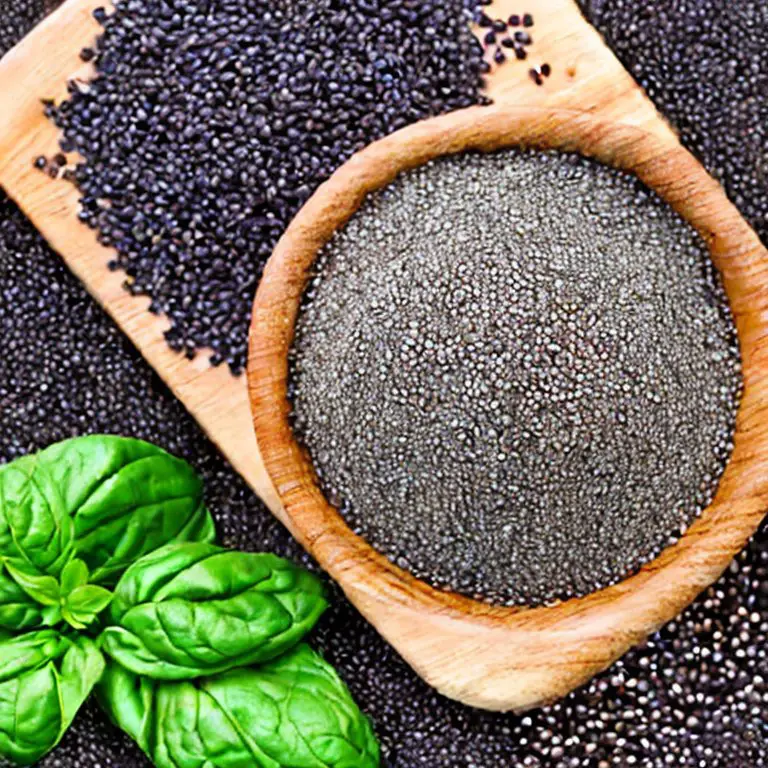
Ultimately, chia seeds and basil seeds are similar in size, but have some differences in appearance. Chia seeds are small, black or white seeds that are oval in shape and have a smooth surface, while basil seeds are small, black seeds that are oval in shape and have a slightly rougher surface.
Nutrition
Chia seeds are generally more nutritious than basil seeds. Chia seeds are a good source of fiber, protein, and omega-3 fatty acids, while basil seeds are mostly composed of carbohydrates and have a lower fiber and protein content. One ounce (28 grams) of chia seeds contains about 11 grams of fiber, 4 grams of protein, and 5 grams of omega-3 fatty acids, while one ounce (28 grams) of basil seeds contains about 3 grams of fiber and 2 grams of protein.
Benefits
Chia seeds may have more potential health benefits due to their higher nutrient content. Chia seeds are a good source of fiber, which can help to improve digestion and promote regular bowel movements. The high omega-3 content of chia seeds may also have anti-inflammatory effects, which may help to reduce the risk of chronic diseases such as heart disease and diabetes.
Some studies have also suggested that chia seeds may help to lower blood pressure and cholesterol levels, although more research is needed to confirm these effects.
Basil seeds, on the other hand, are believed to have a number of health benefits, including aiding digestion and helping to reduce body heat, but there is limited scientific research to support these claims.
(You can find a deeper look at the difference in benefits at Chia Seeds vs Basil Seeds Benefits)
Taste
Chia seeds and basil seeds have slightly different tastes. Chia seeds have a mild, nutty flavor that is not overpowering, and can be easily incorporated into a variety of dishes. They have a slightly crunchy texture when eaten raw, and become more tender when soaked in liquid. Chia seeds can be eaten on their own or added to dishes as a topping or ingredient.
Basil seeds have a sweet, slightly nutty flavor, and are often used in combination with other ingredients such as rose water, milk, and fruit. They are often used in Indian and Middle Eastern cuisine, and are known for their ability to swell up and form a gel-like consistency when soaked in liquid. Basil seeds have a slightly crunchy texture when eaten raw, and become more tender when soaked in liquid. They are often used in drinks and desserts such as falooda and rooh afza, and have a sweet, slightly nutty flavor.
In summary, chia seeds have a mild, nutty flavor and are often used in a variety of dishes, while basil seeds have a sweet, slightly nutty flavor and are often used in Indian and Middle Eastern cuisine. Both seeds have a slightly crunchy texture when eaten raw, and become more tender when soaked in liquid.
Uses and Applications
Chia seeds and basil seeds can be used in similar ways, such as being soaked in liquid to form a gel-like consistency, but they are also used in different ways. Chia seeds can be eaten raw or ground up, and are often used in baked goods, smoothies, and as a topping for salads and other dishes. They can also be used as an egg replacer in vegan recipes, as they can bind ingredients together when mixed with water.
Basil seeds, on the other hand, are often used in Indian and Middle Eastern cuisine, and are known for their ability to swell up and form a gel-like consistency when soaked in liquid. They are often used in drinks and desserts such as falooda and rooh afza, and have a sweet, slightly nutty flavor.
Common Questions
Chia Seeds vs Basil Seeds for Weight Loss
Both chia seeds and basil seeds may potentially have some benefits for weight loss, although it is important to note that no single food can be solely responsible for weight loss. A healthy, balanced diet and regular exercise are key factors in achieving and maintaining a healthy weight.
Chia seeds are high in fiber, which can help to promote feelings of fullness and reduce appetite. They are also a good source of protein, which can help to increase metabolism and promote muscle growth. Some studies have suggested that the high fiber and protein content of chia seeds may help to reduce body weight and body fat, although more research is needed to confirm these effects.
Basil seeds may also potentially have some benefits for weight loss, although there is limited scientific research on this topic. Some people believe that basil seeds can help to improve digestion and reduce body heat, which may potentially contribute to weight loss. However, more research is needed to confirm these effects and determine the extent to which basil seeds may be helpful for weight loss.
In summary, while both chia seeds and basil seeds may potentially have some benefits for weight loss, it is important to maintain a healthy, balanced diet and engage in regular exercise in order to achieve and maintain a healthy weight. It is also important to talk to a healthcare provider or registered dietitian before making any changes to your diet or exercise routine.
Can You Eat Chia Seeds and Basil Seeds Together?
Yes, it is possible to eat chia seeds and basil seeds together, either in the same dish or as part of a larger meal. Both chia seeds and basil seeds have unique properties and can be used in a variety of dishes, so they can be combined in a number of ways.
Chia seeds and basil seeds can be soaked in water to form a gel-like consistency, and can be used together in drinks and desserts such as smoothies, puddings, and fruit dips. They can also be mixed together and added to baked goods, such as breads, muffins, and cookies. Both seeds have a slightly crunchy texture when eaten raw, and can be used as a topping for yogurt, oatmeal, and other breakfast dishes.
Chia seeds and basil seeds can also be used together in savory dishes, such as salads, stir-fries, and grain bowls. They can be mixed into dressings, sauces, and dips, or used as a topping for roasted vegetables and other dishes. Both seeds have a slightly nutty flavor and can add texture and nutrition to a variety of dishes.
In summary, chia seeds and basil seeds can be eaten together in a variety of dishes, either as a topping or ingredient. They can be soaked in water to form a gel-like consistency, and can be used in both sweet and savory dishes. It is important to note that both seeds should be used in moderation as part of a balanced diet, as they are high in calories and should not be consumed in large quantities.
Are Chia Seeds and Basil Seeds the Same?
No, chia seeds and basil seeds are not the same. Chia seeds and basil seeds are different types of seeds that come from different plants and have different uses and nutritional profiles.
Chia seeds are high in fiber and omega-3 fatty acids, and are often used in a variety of dishes, while basil seeds are mostly composed of carbohydrates and are often used in Indian and Middle Eastern cuisine.
Final Thoughts
In conclusion, chia seeds and basil seeds are two types of seeds that are often used in cooking and for their supposed health benefits. While both seeds have unique properties and are believed to have a number of health benefits, they come from different plants and have some differences in terms of their nutrition and uses.
Chia seeds are a good source of fiber, protein, and omega-3 fatty acids, and are also a good source of antioxidants, minerals, and other nutrients. Basil seeds, on the other hand, are mostly composed of carbohydrates and have a lower fiber and protein content.
Both seeds can be used as a topping or added to recipes to add texture and nutrition, but chia seeds may have more potential health benefits due to their higher nutrient content.
Lance has been passionate about the plant-based diet and we have been following a whole food plant-based diet for over 5 years. We focus on health, natural healing, weight management, animal rights, and the health of the planet and environment by focusing on whole plant-based foods and sustainable practices.
Learn more at the About Me page and follow on social media at the links below.

